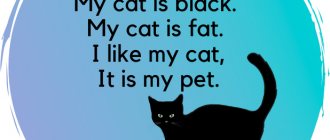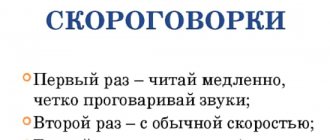According to the results of a study by modern Russian scientists, at least 15% of the Russian population have serious problems with diction. Is your vocabulary limited? Do you sometimes pronounce certain sounds incorrectly? The longest tongue twister “Liguria” will help get rid of these shortcomings. The text of this poem is indeed very long and complex. There is no need to force yourself to learn it completely at any cost. Start with small parts, and gradually combine everything into one tongue twister.
If the problem with word pronunciation or diction is severe enough, seek help from a professional speech therapist. Classes with such a master will definitely be effective.
If you have a lot of free time, you can practice speech development on your own, at home. “Liguria” and other longest tongue twisters in the world will help you with this.
How are tongue twisters useful?
A tongue twister is a rhyme or sentence that allows you to train speech and articulation. As a rule, poems are composed by folk craftsmen and have a humorous orientation. However, the main thing in such a work is the awkward combination of sounds, which can be very difficult to pronounce. Most speech therapists recommend learning tongue twisters for diction and increasing vocabulary.
Choose poems that contain a lot of sounds that you can’t pronounce. For example, if you do not clearly pronounce the sounds “ch”, “l”, “r”, feel free to learn the first small part of Liguria - “On Thursday the fourth, at four and a quarter o’clock, the Ligurian traffic controller was regulating in Liguria.”
Such phrases are very difficult for an adult to pronounce, but useful daily diction training will help you quickly improve your speech apparatus and significantly increase your vocabulary. If you can handle the longest tongue twister in the world, you can be sure that in the future you will definitely become an excellent speaker and be able to build a successful career.
History of origin
The longest tongue twister in the world has its own origin story: it talks about the small Italian town of Liguria. Talking about life in the town, several small stories go through, and gradually all the sounds with which there are problems in pronunciation are spoken out.
Tongue twisters belong to folk art. In ancient times, people came up with funny poems with original combinations of words with the same sounds. This fact makes them difficult to pronounce, but repeated repetition of tongue twisters gives amazing results for correcting speech.
Features of the tongue twister “Liguria”
Professional speech therapists (speech therapists and linguists) claim that “Liguria” is not only the longest, but also the most complex tongue twister in the Russian language. With the help of such a verse, you can learn a variety of phonemes, train memory, articulation and pronunciation. The whole family can study the poem, because it is useful not only for adults, but also for teenagers. Beautiful, clear, correctly delivered speech will help anyone win the attention and respect of others, colleagues, and listeners.
Not every announcer knows Liguria by heart. If the beginning, in which the “Ligurian traffic controller” appears, can still be remembered, then by the middle of the text many people’s thoughts are simply confused. To begin with, speech therapists recommend learning to read a poem at a fast pace, and only after that start learning it in separate parts.
Patter for clear diction is used by announcers, athletes, artists and other professionals whose careers require correct and intelligible speech.
Tongue twisters for sibilants
- Shiva walked along the highway, crushing existence, and Sasha walked towards him, sucking round.
- In the hut, a yellow dervish from Algeria rustles with silks and, juggling with knives, eats a piece of fig.
- Dashka has whiskey in his pocket for Natasha.
- Notification via broadcast media: “All townsfolk with things for the meeting.”
- Sasha herself is perfection, and she’s also improving herself!
- You even stained your neck, even your ears with black mascara. Get in the shower quickly. Rinse the mascara off your ears in the shower. Rinse off the mascara from your neck in the shower. After your shower, dry yourself off. Dry your neck, dry your ears, and don’t dirty your ears anymore.
How to learn “Liguria” in 7 days?
Surely, many have tried more than once to learn the longest tongue twister in the world, but the phrase “the Ligurian traffic controller was regulating...” the process was slowed down. Few people have the patience and perseverance to master this, at first glance, not so long verse (compare at least with “Borodino”).
It is important not only to know the order of words in the text, but also to pronounce them correctly and place emphasis. The difficulty of Liguria is that phonemes need to be pronounced at a fast pace. Do you think this is unrealistic?
It turns out there is no special secret in Liguria. You just need to learn it in a certain way and gradually. Don't be alarmed. You don't need to devote months or years to this activity, just one week is enough.
So, let's look at the simplest plan for learning Liguria that is accessible to everyone.
- Day No1. Print out the text of the tongue twister and read it very slowly for 15-20 minutes. Mentally imagine the picture and events discussed in the poem. All words must be pronounced clearly and the correct emphasis must be placed.
- Day No2. Continue reading the tongue twister for 15-20 minutes, but speed up the pace of speech a little.
- Day No3. Now you will need a little more time. Learn the following lines by heart. Here is the text: “On Thursday the fourth, at four and a quarter o’clock, the Ligurian traffic controller was regulating in Liguria, but thirty-three ships tacked, maneuvered, and never got caught, and then the protocol about the protocol was recorded by the protocol, as the interviewed Ligurian traffic controller spoke loudly , but he didn’t report cleanly, but he reported about the wet weather in such a way that the incident would not become a candidate for a judicial precedent.” Repeat the beginning of the tongue twister from memory, and continue reading the rest.
- Day No4. We are learning new 15 lines. We recite 30 lines of Liguria from memory, and quickly read the rest. The lesson will take you 40-50 minutes.
- Day No5. We repeat yesterday with the addition of 15 new lines we learned.
- Day No6. We learn the end of the tongue twister by heart. We repeat all 60 lines at an average pace for 40 minutes. Try not to peek at the text. Liguria's words should already be firmly entrenched in your memory.
- Day No7. By the end of the week, you already know the tongue twister by heart. All that remains is to improve your pronunciation and speed up your speech rate as much as possible. This workout will take you no more than 15 minutes.
If you strictly follow the recommendations presented above, tongue twister for improving diction will not seem like something scary to you. Spend just 50-60 minutes studying every day, and your friends and colleagues will very soon notice how much your speech has improved.
Turn Liguria lessons into a fun family game. Compare your results and the results of your loved ones, reward the winners with small prizes.
How does it work?
The longest tongue twister, the text of which is full of various funny images: first there is a traffic controller and here the emphasis is on the pronunciation of the sound “r”, then the story in the town moves on to Clara and Karl, and the emphasis is on the sound “l”. Clara is replaced by Varvara - the pronunciation of the sound “r” is fixed. And “haughters” help to work with the sound “x”.
Then there is work through comic images with the sounds “s, k” and others. Children love games, and this method of working with sounds, like a tongue twister, is perfect for this.
The story of adventures in the city rolls from hero to hero, and in fact, work with sounds takes place in the game, unnoticed by the one with whom the work is being done to improve speech and pronounce problematic sounds.
Read also: pastel orange IN COLOR BALANCE
Here is such an intricate, longest tongue twister, the text of which is quite difficult to pronounce, sometimes even the tongue becomes slurred, but having mastered it, the speech of anyone who comes into contact with it becomes easy, clear. Sounds are pronounced without hesitation, distinctly and clearly. Magic tongue twister...
Video with correct pronunciation
To understand how to correctly pronounce the tongue twister "Liguria", watch the video. In the video, famous presenters and announcers recite this poem by heart. TV presenter Elena Solomina and Gabriela Antocel masterfully handle the longest patter.
All you have to do is put in a little effort and persistence, and you will be able to learn the original tongue twister “Liguria”. The tongue twister is designed for teenage children and adults. It is better for kids to start learning simpler rhymes, gradually increasing their complexity. If your child thinks figuratively from early childhood, he can easily remember a simple rhyme.
How to practice
In order for the results of the training to be noticeable, the following rules must be followed:
- recite tongue twisters regularly - daily 2-5 times for 10 minutes;
- reminders – print out 3–5 tongue twisters on a sheet of paper, hang them in visible places;
- changes - tongue twisters should be changed every 10 days to prevent the articulation apparatus from becoming accustomed.
You should not immediately try to pronounce the tongue twister quickly. You need to pronounce each word slowly and rhythmically, to understand the meaning of the difficult phrase. Increase the pace gradually, trying to pronounce the phrase in one breath. Pay special attention to the clear pronunciation of endings - activate consonant sounds, not make them heavier.
Before starting classes, do a light warm-up. Say the sound “g” and “k” three times. Then, with your mouth half open, pronounce the vowels “a”, “o”, “e” - each sound 3 times. Rinse your mouth with air to relax your muscles.
Articulation gymnastics
Articulation teaches you how to position your tongue and lips correctly and direct the air flow. Gymnastics prepares the articulatory apparatus for pronouncing complex tongue twisters.
You need to exercise daily for 3–5 minutes. Perform exercises while sitting, back straight, muscles relaxed. Carry out gymnastics in front of a mirror to control the correctness of the exercises. Perform each exercise until the facial muscles are slightly tense.
Basic exercises:
- Smile widely, expose your upper and lower teeth, hold the position for 10 seconds.
- Pull your lips forward, blowing on the invisible fluff.
- Alternate the first and second exercises at a fast and slow pace. The lower jaw should remain motionless.
- Open and close your mouth in a wide smile.
- Smile, open your mouth slightly, put your wide tongue on your lower lip.
- Open your mouth, stick out your tongue, stretch out the tip - the tongue becomes narrow.
- Alternate wide and narrow tongue at a slow and fast pace.
- Raise the tip of the tongue by the upper front teeth.
- Fix the tongue behind the lower front teeth.
- Move your tongue up and down and hold it behind the upper and lower teeth for 2 seconds.
- Lower the tip of your tongue and move it deeper into your mouth. Alternately bring the tongue closer to the right and left front incisors.
Such gymnastics is the best practice for mastering the basic correct positions of the lips and tongue.
About the benefits of tongue twisters
Tongue twisters (pure twisters) are works of folk art, funny phrases and rhymes invented by people in order to improve articulation and correct individual diction defects. They consist of a certain number of words with many of the same sounds, which makes them difficult to pronounce.
The phrases found in the tongue twister “Liguria” are inconvenient to pronounce, therefore they are good training for the articulatory apparatus, forcing the speech organs to work hard, improving their functions. The Liguria tongue twister will help you practice so that after it even the most complex text will come out of your mouth easily and freely, every sound will be heard, which means your pronunciation will significantly improve.
How to work with tongue twisters to improve diction
Speech therapists use tongue twisters to teach children and adults to clearly pronounce similar sounds.
We are talking about sounds, for the formation of which the tongue, jaw, and facial muscles make similar movements. Most often, difficulties arise with “l” and “r”: both sounds require the tongue to rise to the roof of the mouth and its tip to remain soft. Another pair of problematic sounds are “s” and “sh”, “m” and “n”. If your speech is not clear enough, you are most likely slurring one of these groups of sounds. It is difficult to independently determine a hearing defect, so consult a speech therapist or public speaking teacher at least a couple of times so that he can give recommendations on improving diction.
Tongue twisters are built on a combination of a pair of similar, difficult to distinguish sounds, so they help effectively develop speech. Ideally, you should go through all pairs of sounds and all groups of tongue twisters, but if you have problems with the pronunciation of “l”, “r”, “sh”, “s” or other sounds, you should start training with tongue twisters for “problem” syllables. The standard program of exercises with tongue twisters offers the following sequence: first, dull hissing sounds, then whistling and voiced sounds, and finally sonorant sounds.
This order is not random, because voiceless sounds are easiest to pronounce, sonorant sounds are the most difficult. It is not without reason that most often children and adults have problems with sonorant “r” and “l”. Of course, you can train in any order, and the improvement in speech will become noticeable over time. But the results will be faster and more noticeable if you follow the correct sequence.
Speed of pronunciation of tongue twisters
When you start working with tongue twisters, don't pronounce them quickly. To improve your speech, you need to increase the pace gradually, carefully monitoring your diction. Take one tongue twister, for example: “Karl stole corals from Clara.” First, say it very slowly and silently - just move your lips as if you are speaking, but do not make a sound. Then say “Karl stole coral from Clara” slowly and in a whisper. Make sure that every sound is pronounced very carefully, deliberately. For the third time, say the tongue twister at a natural pace and in a full voice.
If you can’t immediately say “Karl stole coral from Clara” without stuttering, speak a little slower than usual. Only when you can speak in a calm, conversational manner, say the same line at a fast pace. All attention to the clarity of diction and articulation!
The main thing is not speed, it will come with time. The correct pronunciation of each sound is more important. The final stage is pronunciation with an obstacle, a “plug” for the tongue: pebbles or nuts that will impede articulation. This is an effective way to improve diction. Take your time, talk to the stones slowly at first, then faster. So you need to work through each selected tongue twister, and more than once.
If you are not a professional, it is enough to practice for half an hour 5-6 days a week to achieve a significant improvement in diction in a month with such exercises. Often, students of rhetoric courses get down to business with enthusiasm, but quickly cool down. To prevent this from happening, do not try to embrace the immensity in one day: half an hour of exercise is enough. It’s better to spend half an hour every day or at least every other day than two hours once a week. Pay attention to correct speech.
The text of the most difficult tongue twister, try also:
Yes, and Klara the King was sneaking to the chest at that time, while Karl was stealing corals from Klara, for which Klara stole the clarinet from Karl, and then in the yard of Varvara, the tar widow, these two thieves stole firewood. But it’s a sin - not laughter - not to put it in a nut: about Klara and Karl in the darkness, all the crayfish were making noise in a fight - so the thieves had no time for the bombardier, but they had no time for the tar widow, and no time for the tar children. But the angry widow put the firewood into the barn: once firewood, two firewood, three firewood - all the firewood could not fit, and two woodcutters, two woodcutters, for the emotional Varvara, expelled the firewood across the width of the yard back to the wood yard, where the heron withered, the heron withered, the heron died.
The heron's chick clung tenaciously to the chain; well done against the sheep, and against the well done the sheep itself, to which Senya carries hay in a sleigh, then Senka carries Sonya and Sanka on a sled: the sled hops, Senka sideways, Sonya head on, everything into a snowdrift, and from there only a head of bumps knocked down Then Sasha went along the highway, Sasha found a sachet on the highway. Sonya - Sashka’s friend was walking along the highway and sucking on a dryer, and besides, Sonya the turntable also had three cheesecakes in her mouth - exactly like a honey cake, but she had no time for a honey cake - Sonya, even with cheesecakes in the sexton’s mouth, would over-mix, - over-make: buzzing like ground beetle, buzzing and spinning.
I was at Frol's - Frol lied to Lavra, he will go to the Lavra to Frol Lavra and lie to him that - the sergeant and the sergeant, the captain and the captain, the snake - the snake, the hedgehog - the hedgehog, and his high-ranking guest took away his cane, and soon again five guys We ate five again and half a quarter of a quart of lentils without a wormhole, and one thousand six hundred and sixty-six pies with cottage cheese from the whey from the yogurt.
About everything about this, around the bell the bells were ringing, so much so that even Konstantin, a Salzburg unpromising man, stated from under an armored personnel carrier: just as all the bells cannot be re-ringed, not belled again, so all the tongue twisters cannot be re-spoken, not re-spoken.
But trying is not torture!









